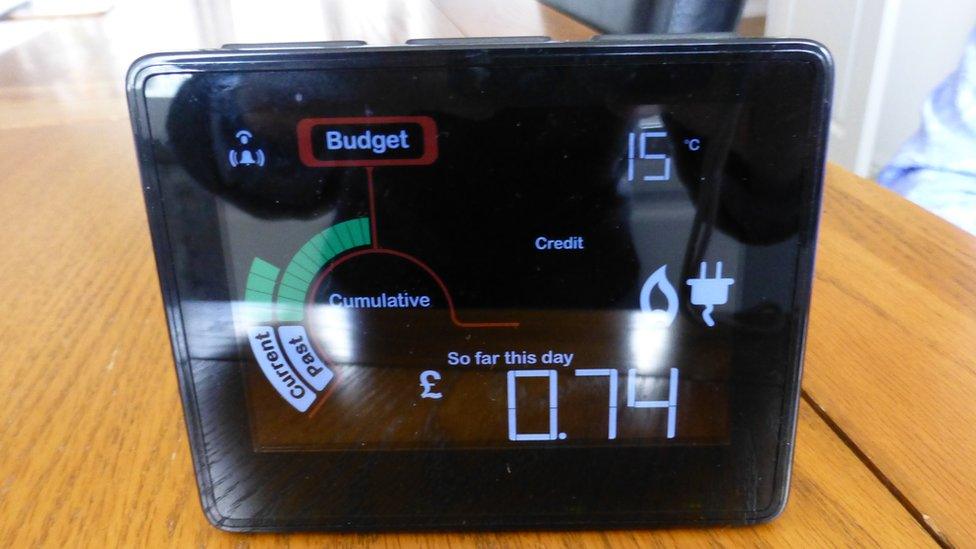Smart meters to cut energy bills by just £11, say MPs
- Published
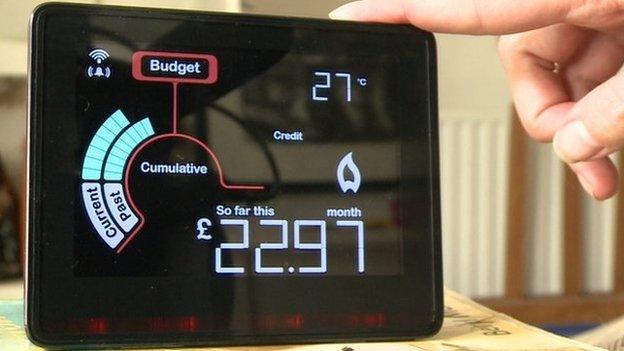
People who have smart meters installed are expected to save an average of £11 annually on their energy bills, much less than originally hoped.
A report from a parliamentary group now predicts a dual fuel saving of £26.
In a critical report, the 92 MPs and peers also said the government was likely to miss its own deadline, external to have the £11bn switchover completed.
Up to 53 million smart meters were to be installed in 30 million homes and businesses by the end of 2020.
A smart meter is designed to replace traditional gas and electricity meters.
It automatically sends usage data to suppliers via the mobile phone network, and comes with a display showing users how much energy they are using - and the cost in pounds and pence.
Conservative MP Grant Shapps, the chairman of the British Infrastructure Group (BIG), said the programme had been "plagued by repeated delays and cost increases, with suppliers now almost certain to miss the 2020 deadline, and programme benefits likely to be slashed even further".
Speaking on BBC Radio 4's Today programme, Mr Shapps said one of the reasons for the "mess" was that "first generation" smart meters, which do not always work when a customer switches supplier, will continue to be rolled out until next year.
He added: "We need to shift to a reliable timetable, we need to quit installing obsolete old meters... and we need to have the regulator become a lot tougher."
The government said smart meters were already putting consumers in control of their energy use, while industry body Energy UK said suppliers were committed to meeting the deadline of seeing all households and businesses offered a smart meter by 2020.
Smart Energy GB, which is promoting the roll out of the smart meters, said: "All smart meters mean an end to estimated billing and give people a greater understanding of their energy use.
"Smart meters are also making prepay cheaper and more convenient, bringing the way we pay for our energy up-to-date, enabling customers to top up online or over the phone."
Grant Shapps: Messy delivery means households are losing out on smart meter benefits
Customers have financed the smart meter programme by paying a levy on their energy bills, while suppliers have frequently blamed the levy for rising costs.
However, the report claimed most of the eventual savings would be made by energy firms, rather than consumers.
"The roll-out is consequently at serious risk of becoming yet another large scale public infrastructure project delivered well over time and budget, and which fails to provide energy customers with a meaningful return on their investment," said Mr Shapps.

Smart meters and the 'clean vehicle revolution'
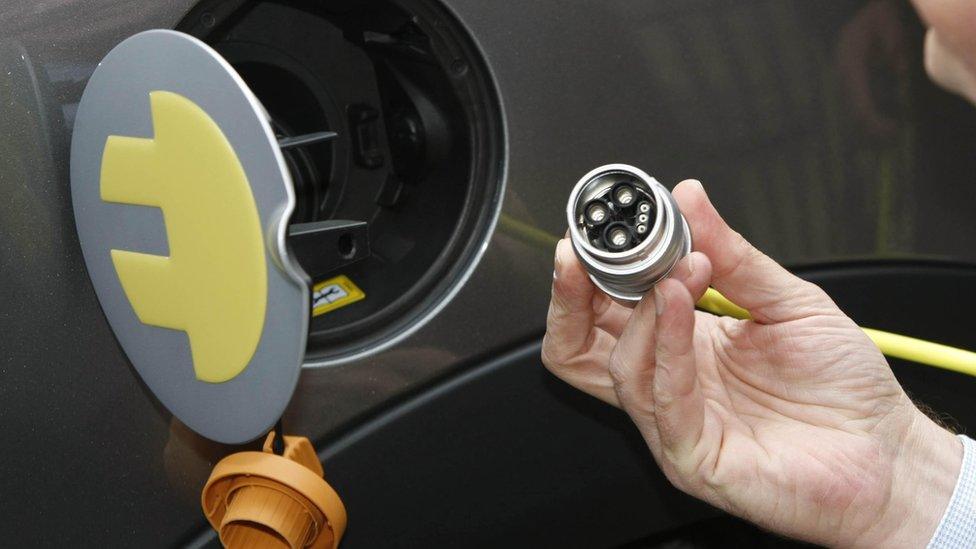
By Roger Harrabin, BBC environment analyst
Smart meters are supposed to play a major part in the UK's clean vehicle revolution by allowing electric cars to charge overnight when wind power is strong, demand is low, and energy is cheap.
It's just as well, as by 2030 the government wants half of new cars to be powered by electricity or fuel cells as part of a global move to combat climate change and clean up pollution.
The promise of variable charging has encouraged National Grid to re-assure the public that supplying extra energy for vehicles won't be a big deal.
So far so good. But it's alleged that many of the first generation smart meters won't be intelligent enough to offer sophisticated variable rate charging.
Energy saving expert Andrew Warren says that means extra energy will need to be generated to charge electric cars - which will put up costs for everyone.
Follow Roger on Twitter, external

The MPs also said some suppliers had been engaging in "scare tactics" to convince customers to have a meter installed, in order for targets to be reached.
'Going dumb'
Such tactics included firms telling customers that their bills would go up unless they agreed to have a meter, or that their old meter was dangerous.
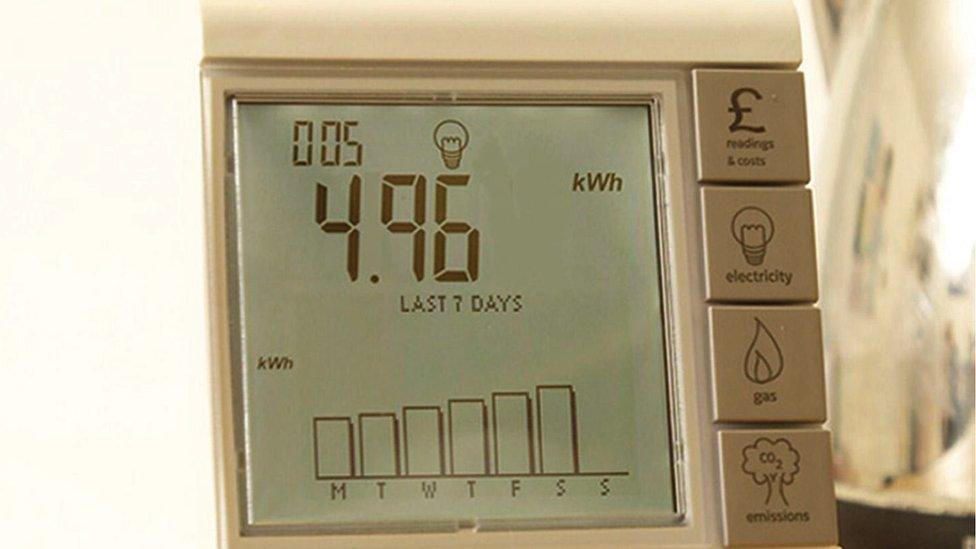
The report also said that:
More than half of smart meters "go dumb" after switching, meaning they stop communicating with the supplier
Up to 10% of smart meters don't work, because they are in areas where mobile phone signals are not strong enough
By the end of the year only 22% of households will have the meters installed, meaning the 2020 deadline is certain to be missed
The eventual cost of the programme could even outweigh the benefits
The report said the government should now plan for the roll-out to be completed by 2022, and that supply of the new generation of smart meters should be sped up.
They also said customers should be automatically compensated for each day their meter malfunctions.
'Ongoing success'
A spokesman for the Department for Business, Energy and Industrial Strategy said the smart meter roll out was part of plans to drive more competition and consumer choice.
He said an annual saving of £11 per bill equated to an overall reduction of £300m, and this was expected reach £1.2bn, or £47 per household, by 2030.
However the government said it was wrong to call dumb meters "obsolete".
"They offer smart services now and will continue do so as they are enrolled into the smart metering network," he said.
"However we welcome ideas on how to ensure the ongoing success of the smart meter roll out and are already working with Ofgem on issues raised in the report."
The National Audit Office is already investigating the economic case for the roll-out of smart meters, and is due to report sometime this summer.
Energy UK said: "Suppliers have installed more than 11 million smart meters. However, as with any large and complex infrastructure programme there will be challenges to overcome."
- Published11 January 2018

- Published24 September 2016
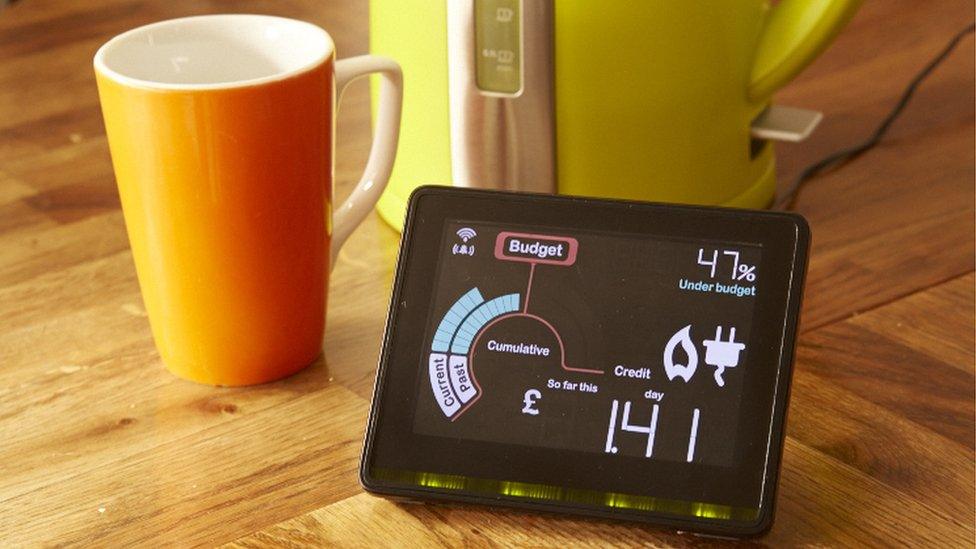
- Published26 March 2016
